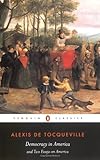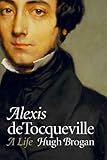|
|
Help |
| Home - Authors - Tocqueville Alexis De (Books) | |
e99 Online Shopping Mall
|
|
Help |
| Home - Authors - Tocqueville Alexis De (Books) | |
| 1-20 of 100 | Next 20 |
click price to see details click image to enlarge click link to go to the store
| 1. Democracy in America - Volume 1 by Alexis de Tocqueville | |
 | Paperback: 354
Pages
(2010-07-06)
list price: US$9.99 -- used & new: US$9.99 (price subject to change: see help) Asin: B003XVZKWQ Average Customer Review: Canada | United Kingdom | Germany | France | Japan |
|
Editorial Review Product Description Customer Reviews (2)
| |
| 2. Democracy in America - Volume 2 by Alexis de Tocqueville | |
 | Paperback: 300
Pages
(2010-07-06)
list price: US$9.99 -- used & new: US$9.99 (price subject to change: see help) Asin: B003XW039U Average Customer Review: Canada | United Kingdom | Germany | France | Japan |
|
Editorial Review Product Description Customer Reviews (2)
| |
| 3. Democracy in America (Penguin Classics) by Alexis de Tocqueville | |
 | Paperback: 992
Pages
(2003-07-01)
list price: US$12.00 -- used & new: US$5.03 (price subject to change: see help) Asin: 0140447601 Average Customer Review: Canada | United Kingdom | Germany | France | Japan |
|
Editorial Review Product Description Customer Reviews (31)
| |
| 4. American Institutions and Their Influence (Webster's English Thesaurus Edition) by Alexis de Tocqueville | |
 | Paperback: 666
Pages
(2008-05-29)
list price: US$28.95 -- used & new: US$28.95 (price subject to change: see help) Asin: B001CV1GHC Canada | United Kingdom | Germany | France | Japan |
|
Editorial Review Product Description | |
| 5. Democracy in America (Volumes 1 and 2, Unabridged) by Alexis de Tocqueville | |
 | Paperback: 540
Pages
(2007-01-01)
list price: US$17.99 -- used & new: US$17.03 (price subject to change: see help) Asin: 1420929127 Average Customer Review: Canada | United Kingdom | Germany | France | Japan |
|
Editorial Review Product Description Customer Reviews (1)
| |
| 6. Democracy in America, Volume I and II (Optimized for Kindle) by Alexis De Tocqueville | |
 | Kindle Edition:
Pages
(2007-06-13)
list price: US$0.99 Asin: B00307S1MY Average Customer Review: Canada | United Kingdom | Germany | France | Japan |
Customer Reviews (1)
| |
| 7. Recollections (Social Science Classics Series) by Alexis de Tocqueville | |
 | Paperback: 333
Pages
(1987-01-01)
list price: US$21.95 -- used & new: US$21.95 (price subject to change: see help) Asin: 088738658X Average Customer Review: Canada | United Kingdom | Germany | France | Japan |
|
Editorial Review Product Description Customer Reviews (1)
| |
| 8. Letters from America by Alexis de Tocqueville | |
 | Hardcover: 304
Pages
(2010-11-30)
list price: US$28.00 -- used & new: US$18.27 (price subject to change: see help) Asin: 0300153821 Canada | United Kingdom | Germany | France | Japan |
|
Editorial Review Product Description | |
| 9. Tocqueville: Democracy in America (Library of America) by Alexis de Tocqueville | |
 | Hardcover: 928
Pages
(2004-02-09)
list price: US$35.00 -- used & new: US$18.67 (price subject to change: see help) Asin: 1931082545 Average Customer Review: Canada | United Kingdom | Germany | France | Japan |
|
Editorial Review Product Description Customer Reviews (21)
| |
| 10. Democracy in America by Alexis de Tocqueville | |
 | Paperback: 722
Pages
(2002-04-01)
list price: US$22.00 -- used & new: US$5.09 (price subject to change: see help) Asin: 0226805360 Average Customer Review: Canada | United Kingdom | Germany | France | Japan |
|
Editorial Review Product Description Customer Reviews (21)
| |
| 11. Democracy in America by Alexis de Tocqueville, Stephen D. Grant | |
 | Paperback: 331
Pages
(2000-06)
list price: US$9.95 -- used & new: US$5.09 (price subject to change: see help) Asin: 0872204944 Average Customer Review: Canada | United Kingdom | Germany | France | Japan |
|
Editorial Review Product Description Customer Reviews (4)
| |
| 12. The Works of Alexis de Tocqueville: Democracy in America and American Institutions and Their Influence (Halcyon Classics) by Alexis de Tocqueville | |
 | Kindle Edition:
Pages
(2010-03-24)
list price: US$1.99 Asin: B003E35YT2 Average Customer Review: Canada | United Kingdom | Germany | France | Japan |
|
Editorial Review Product Description Customer Reviews (1)
| |
| 13. Democracy in America (Norton Critical Editions) by Alexis de Tocqueville | |
 | Paperback: 896
Pages
(2007-08-21)
-- used & new: US$5.09 (price subject to change: see help) Asin: 0393929868 Average Customer Review: Canada | United Kingdom | Germany | France | Japan |
|
Editorial Review Product Description Customer Reviews (1)
| |
| 14. Ancien Regime and the French Revolution (Penguin Classics) by Alexis de Tocqueville | |
 | Paperback: 336
Pages
(2008-07-29)
list price: US$15.00 -- used & new: US$8.55 (price subject to change: see help) Asin: 014144164X Average Customer Review: Canada | United Kingdom | Germany | France | Japan |
|
Editorial Review Product Description Customer Reviews (2)
| |
| 15. Alexis de Tocqueville: A Life by Professor Hugh Brogan | |
 | Paperback: 736
Pages
(2008-04-01)
list price: US$20.00 -- used & new: US$9.60 (price subject to change: see help) Asin: 0300136250 Average Customer Review: Canada | United Kingdom | Germany | France | Japan |
|
Editorial Review Product Description Customer Reviews (6)
| |
| 16. Alexis de Tocqueville. La democracia en America (Spanish Edition) by Alexis de Tocqueville | |
 | Hardcover: 1360
Pages
(2010-05-10)
list price: US$84.95 -- used & new: US$84.95 (price subject to change: see help) Asin: 8498791227 Average Customer Review: Canada | United Kingdom | Germany | France | Japan |
|
Editorial Review Product Description Customer Reviews (1)
| |
| 17. Correspondence and Conversations of Alexis De Tocqueville With Nassau William Senior From 1834 to 1859, Volume 2 by Alexis De Tocqueville | |
 | Paperback: 144
Pages
(2010-03-07)
list price: US$23.28 -- used & new: US$23.28 (price subject to change: see help) Asin: 1153597624 Canada | United Kingdom | Germany | France | Japan |
|
Editorial Review Product Description | |
| 18. Alexis De Tocqueville's Journey to Ireland by Alexis de Tocqueville, Emmet J. Larkin | |
| Paperback: 157
Pages
(1990-05)
list price: US$14.95 -- used & new: US$9.99 (price subject to change: see help) Asin: 0813207193 Canada | United Kingdom | Germany | France | Japan | |
| 19. Democracy in America by Alexis de Tocqueville, Henry Reeve, John C. 1788-1855 Spencer | |
 | Paperback: 522
Pages
(2010-08-29)
list price: US$39.75 -- used & new: US$28.70 (price subject to change: see help) Asin: 1177938413 Average Customer Review: Canada | United Kingdom | Germany | France | Japan |
|
Editorial Review Product Description "For [Tocqueville] America was both the enticing object and theuniversal symbol of a New World in the making," writes historianand author Daniel J.Boorstin in his introduction to Volume I. "He was a master atseeing and describing the symbolism. Even more important, he wrotewith an uncanny feeling for the grand currents of history and with awholesome sense of how much and how little we can deflect thosecurrents." This edition, the first in a two-volume set, is theHenry Reeve text, revised by Francis Bowen,and further edited by Phillips Bradley. (Click here forinformation about Volume II of Democracy in America.) Ifyou've never read Democracy in America, take this opportunityto discover Tocqueville's startlingly astute observations on ademocracy in its infancy. Customer Reviews (5)
The foresight he had for such a young man is really impressive to read 160 years later.What he saw in the morals, work ethic and government structure of the United States led him to accurately predict many of the ways in which the U.S. would lead and has led the world.At the same time Tocqueville was not oblivious to many of the ills in the America he saw.He very wisely writes of the cancer that the institution of slavery was to not only all black Americans, but to the white, Southern farmers and workers as well. I hate having to give these books "stars" for ratings because in many cases it takes away from the ultimate importance and classic status of a book like this one.Tocqueville does tend to jump around and venture off into different topics that don't fit with the rest of their chapter, which could be attributed to his youth.Also, a few of his predictions, naturally, were way off.A native Texan, I had a good laugh at his view that "the province of Texas is still part of the Mexican dominions, but it will soon contain no Mexicans."But overall Tocqueville's view of America was honest, accurate, and the perfect explanation of why, on a daily basis, people continue to risk their lives to gain the freedom that only the United States of America offers.
| |
| 20. The Old Regime and the French Revolution (Dover Books on History, Political and Social Science) by Alexis de Tocqueville | |
 | Paperback: 352
Pages
(2010-06-17)
list price: US$10.95 -- used & new: US$6.73 (price subject to change: see help) Asin: 0486476022 Canada | United Kingdom | Germany | France | Japan |
|
Editorial Review Product Description | |
| 1-20 of 100 | Next 20 |